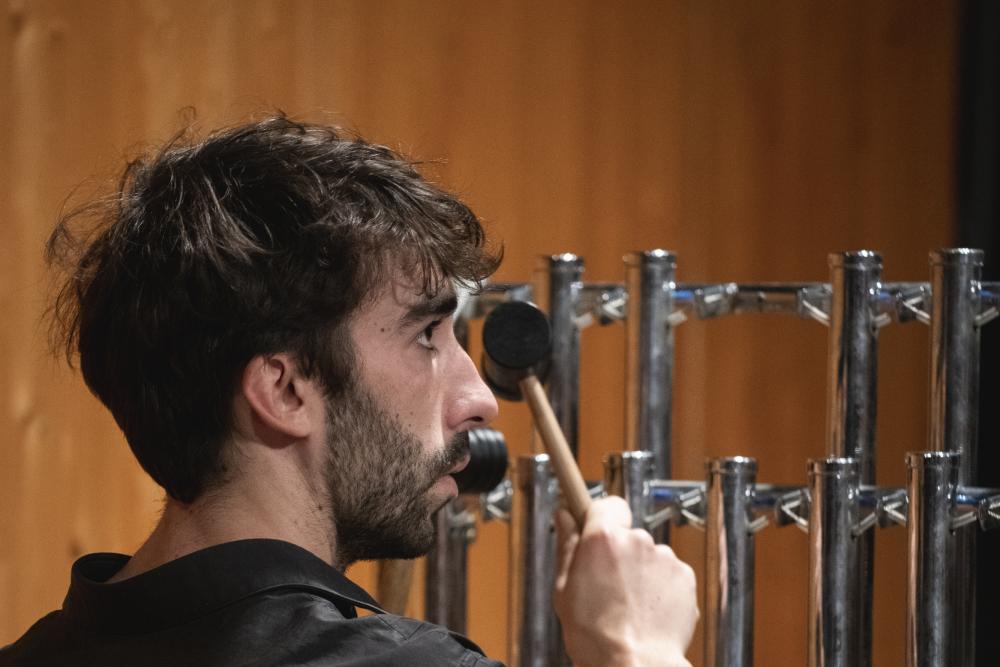Filter list
CloseMusic
DNSPM tracks for instrumentalist-vocalist discipline in the four fields available
In each of the fields available, the DNSPM (National Higher Professional Diploma for Musicians) curriculum is built around individual and group lessons developing the fundamentals of high-level instrumental or vocal practice, plus disciplines linked to knowledge of the professional environment (workshops, courses, orchestral sessions, cross-disciplinary projects, etc.).

Classical to Contemporary Music
The Classical to Contemporary Music track relies heavily on the teaching teams at the two regional conservatoires in Paris and Boulogne-Billancourt for artistic and technical teaching, and those at Sorbonne University for theoretical teaching.
The PSPBB’s partners include the Philharmonie de Paris - Cité de la Musique, the Théâtre de Vanves, the Théâtre du Châtelet, the Ensembles 2e2m and l’Itinéraire, and ProQuartet.
Early Music
The Early Music track offers specific training for instrumentalists and singers wishing to perfect their knowledge of the Renaissance, Baroque and pre-Classical repertoires.
This track relies mainly on the teaching teams of the two regional conservatoires in Paris and Boulogne-Billancourt for artistic and technical teaching, and those at Sorbonne University for theoretical teaching.
The PSPBB’s partners include the Fondation Royaumont, the Centre de Musique Baroque de Versailles, the Concert Spirituel, the Festival de Lanvellec and La Fenice.
Jazz and Improvised Music
In this field, each student’s course of study is developed on the basis of their project and personal creations, with the teaching enabling them to develop as much as possible along the way. Close links are forged with other areas of the music department (MAA, classical and contemporary music, creative professions, etc.) and other departments (drama, jazz dance), leading to joint creations.
This track relies heavily on the teaching teams of the City of Paris conservatoires (CRR and CMA) for artistic and technical teaching.
The Gustave Eiffel University partner offers specific theoretical and technical classes as part of the Music and Sound Engineering degree. The Évry University (CMDL) offers additional theoretical classes as part of its Musicology degree.
The PSPBB’s partners include the Petite Halle, the Duc des Lombards, the Théâtre de Vanves, Les Disquaires, Le Parc Floral, the Parisian Contemporary Music Network (MAP), the Île-de-France Contemporary Music Network and Pôle emploi spectacle.
Amplified Contemporary Music
In this field, as in the Jazz and Improvised Music course, each student’s course of study is developed on the basis of their own project and personal creations, with the teaching enabling them to develop as much as possible along the way. Close links are forged with other areas of the music department (jazz and improvised music, classical and contemporary music, creative professions, etc.) and other departments (drama, jazz dance), leading to joint creations.
This track relies heavily on the teaching staff of the City of Paris conservatoires (CRR and CMA) for artistic and technical teaching.
The Gustave Eiffel University partner offers specific theoretical and technical classes as part of the Music and Sound Engineering degree.
The PSPBB’s partners include all the SMACs in the Ile-de-France region, the Petite Halle, the Théâtre de Vanves, the Bellevilloise, etc.